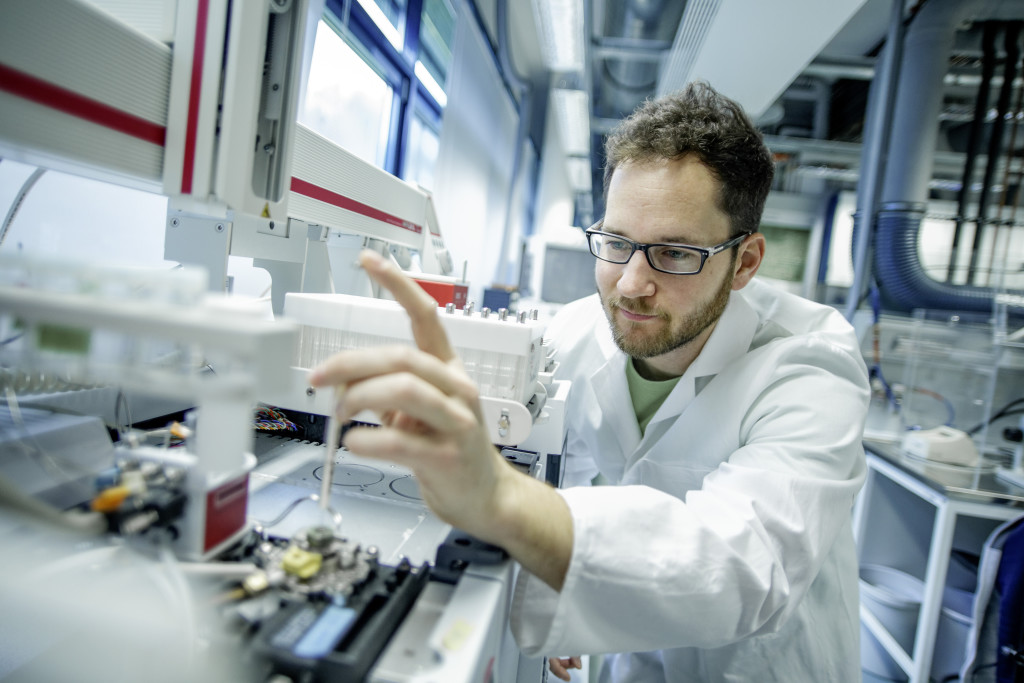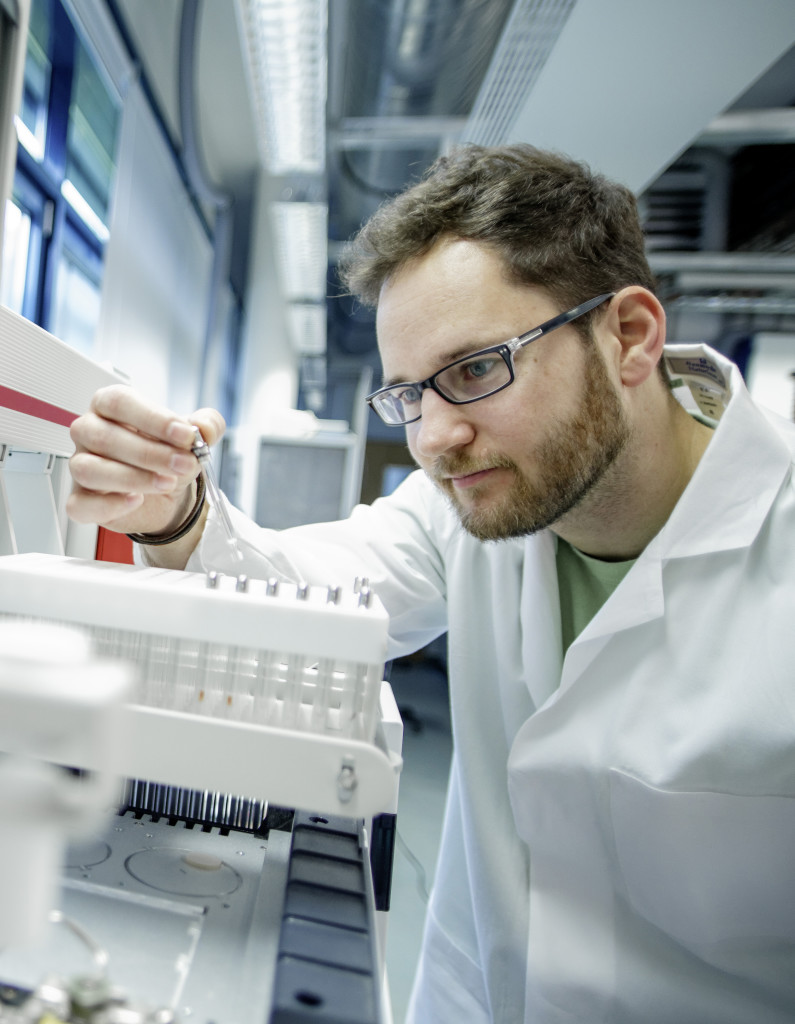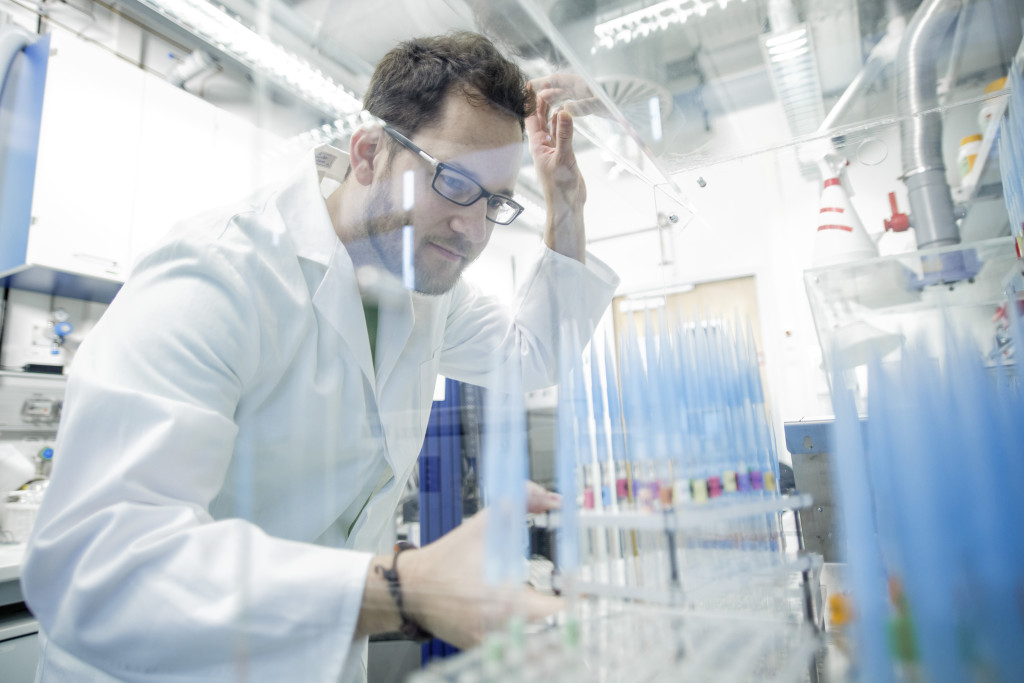
Ian Keesey ’04 is a postdoctoral fellow at the Max Planck Institute for Chemical Ecology (Photo by Anna Schroll).
Imagine waking up every morning and going to work surrounded by some of the foremost scientists and researchers in the world. That is the situation Gustavus Adolphus College alumnus Ian Keesey ’04 finds himself in as a postdoctoral fellow at the Max Planck Institute for Chemical Ecology (MPI-CE) in Jena, Germany.
Rewind about 15 years and Keesey’s journey to Germany begins in St. Peter. On the cusp of accepting an offer of admission at either St. Olaf or Carleton, Keesey and his father decided to make one more visit to Gustavus before making a final decision.
“I visited the campuses back-to-back and I just realized how much happier everyone looked in St. Peter than in Northfield,” Keesey said. “Looking back it was a really obvious difference, and I can still remember that overwhelmingly positive feeling when I walked onto the Gustavus campus that second time.”
The rest, as they say, is history. He came to Gustavus planning to focus his studies strictly on biology and psychology for a career in human neurobiology, but soon discovered that Gustavus’s liberal arts curriculum had much more to offer.
“My overall experience while a student at Gustavus was one of academic exploration. I ended up majoring in biology, though I dabbled quite a bit in chemistry, psychology, and Latin,” Keesey said. “I quickly discovered that my passionate professors were contagious in the enthusiasm that they had for their subject matter. Thus, I swayed toward a wider breadth of scientific coursework than I had initially anticipated, especially due to the guidance of Dr. John Lammert and Dr. Pamela Kittelson, both of whom were really memorable in the classroom and in the laboratory. This meant that for the first time I was exposed to microbial and plant sciences—two areas of study that I continue to passionately explore in my own research endeavors.”
In addition to the academic coursework, Keesey said that Gustavus left an equally important mark on his life by enhancing his interactive and cooperative abilities in his work, his social life and everywhere in between.
“Perhaps it was the numerous public speaking requirements, or just the comfort that I felt while on campus, but I really opened up socially and became much more confident and better at not just interacting with people, but also understanding them,” Keesey said. “This has become a huge tool for my success in science as both a presenter of my work and as a laboratory manager.”
After completing his bachelor’s degree at Gustavus, Keesey proceeded to earn his master’s degree in entomology and his Ph.D. in plant, insect, and microbial science at the University of Missouri in Columbia. As Keesey was nearing the end of his doctorate work, he took an international course at Penn State University that had representatives from 18 different countries. It was there that Keesey was offered an interview for his postdoctoral fellowship in Germany at MPI-CE. Competing against four other invited scientists from England, France, India, and China, Keesey was offered the fellowship after a series of on-site interviews and a formal presentation of his Ph.D. research.
Cutting Edge Research
The Max Planck Society, which encompasses nearly 80 research institutes all over Germany, as well as in other European countries, and abroad, is Germany’s most successful research organization. Since its establishment in 1948, no fewer than 18 Nobel laureates have emerged from the ranks of its scientists, putting it on par with the best and most prestigious research institutions worldwide. Scientists who land at one of the Society’s institutes have “arrived” so to speak.
Keesey is currently working within the Department of Evolutionary Neuroethology, which is primarily interested in the chemical to electrical signal transduction that occurs during olfaction—the act or process of smelling.

Keesey majored in biology at Gustavus and went on to earn his master’s degree and Ph.D. from the University of Missouri (Photo by Anna Schroll).
“Essentially I study the chemistry or odors that are detected by insects, and how that olfactory signal is then carried to the behavioral decision-making centers of the brain via chemical and electrical pathways or neuronal circuitry,” Keesey said. “More specifically, my projects are focused on how fruit flies are able to smell fungal, and microbial pathogens as well as other disease agents in the environment in order to avoid these potentially deadly substrates.”
Keesey’s work has rather large implications for not only medical techniques such as early-stage, non-invasive screening (i.e. breath or skin tests), but also delves into furthering the understanding of brain organization, neuronal function and preference-based decision-making.
While Keesey’s research at MPI-CE clearly has benefits to the world as a whole, the personal growth that he has experienced has been immeasurable.
“During my time at MPI-CE, I have become more adept at the most cutting-edge molecular and genetic techniques, as well as becoming accepted into a professional network of scientific peers and colleagues from laboratories around the world—connections that I hope will continue throughout my career.”
It’s a career that has a bright future. Keesey says his short-term goal in the coming years is to apply for a research-heavy professorship at an academic institution here in the United States, that would also allow him to teach young scientists. His long-term goals are more far-reaching.
“I would really like to prepare myself to be a candidate for leadership either at a University or within the U.S. Government, primarily to utilize my passion for science to fight for increased national spending on education and research endeavors so that we can support subsequent generations of inquisitive minds,” Keesey said.
A significant portion of Keesey’s story is yet to be written, and he will have to make tough choices about his future down the road. But right now he can look back at the choice he made 15 years ago–the choice to come to Gustavus–and realize that it was the right one.
###
Media Contact: Director of Media Relations and Internal Communication Luc Hatlestad
luch@gustavus.edu
507-933-7510
